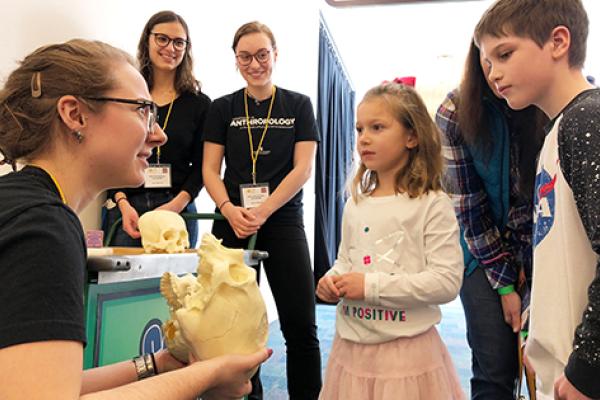Anthropology Public Outreach Program promotes human diversity in community

It’s called APOP, and its gaining support not just at Ohio State, but also in the greater Columbus community.
APOP stands for the Anthropology Public Outreach Program. Initially devised in November 2016, APOP began rolling out projects in January 2018 with the objective of increasing understanding of humanity, promoting cultural awareness and exploring what makes humans — well — human.
The goal is to make sure we are allowing people to make their conclusions by building perspective,” said APOP program director and associate professor of anthropology Mark Hubbe. “So every single activity we do — it doesn’t matter what the topic is about — you have an enlarged perspective of what humanity is.”
In November 2016, several white nationalist, anti-diversity propaganda fliers were posted around the Ohio State campus. This caught the attention of a number of faculty, graduate students, and undergraduates in the Department of Anthropology.
“Within the university, you still have people with very extreme ideas,” Hubbe said. “So we had a meeting organized by the graduate students to see what we could do as a department, to do our part, to change the current situation. There was a lack of information, a lack of education, about human diversity and about social inequality.”
Thus, APOP was born. But it would take some time before the program really got off the ground.
“We decided to take it slowly,” Hubbe said. “We didn’t want to have a program fueled by the anger of the moment. It wasn’t enough to create a little bit of noise just to prove we were discontent with the situation. We wanted to have something that would be long lasting.”
So the APOP team spent the better part of a year deciding what kind of projects they wanted to pursue and how best to create a sustainable program. They also collaboratively designed three pilot programs to kick things off.
“That’s when we started inviting the undergrads to help us,” said Emma Lagan, an anthropology graduate student entering the third year of her PhD. “We really wanted to give them some experience in designing and writing. Each one of them wrote a proposal saying, ‘This is what the point of it’s going to be; this is how we’re going to teach; this is how’s it’s going to be interactive.’”
The first project to go public consisted of a resource database aimed at helping K-12 teachers integrate anthropology into their classrooms. The second program was geared more toward Ohio State undergraduates, who were encouraged to participate in small workshops in their residence halls. These interactive sessions use football fandom to illustrate points about diversity and human behavior.
The last pilot was designed to reach the broader community through the use of six interactive COSI carts. These carts are essentially interactive mini-exhibits, designed and run by anthropology students. The hands-on displays include two archaeology carts, three physical anthropology carts and one biocultural cart, scattered throughout the science museum’s hallways.
Since January 2018, APOP volunteers have run events every other Saturday to provide educational opportunities that would otherwise be inaccessible. All three of these programs are ongoing, and, along the way, APOP also designed and ran an archaeology-themed trial event for the 2018 Ohio Science Olympiad State Tournament.
APOP’s projects give its volunteers an opportunity to teach the material they are learning.
“It’s nice to feel like you’re actually familiar with the material because you can teach it back,” said Kimberly Whitman, who graduated with her bachelor’s degree in anthropology May 2018 and currently works in the Department of Anthropology. “Half of all learning is being able to tell other people about what you’ve been learning.”
In light of these recent successes, APOP is looking forward to expanding during the next academic year. Starting fall 2018, APOP will curate a “Fossil of the Month” display on the fourth floor of Smith Laboratory. This will showcase fossils related to human evolution. It will also implement a K-12 outreach program. So far, 16 schools in the Columbus area have contacted APOP asking them to bring a variation of the carts into their classrooms. As part of this program, APOP will be distributing free educational evolution kits to winners of a video contest. In addition, APOP will be working with COSI to create a long-term interactive evolution exhibit at the museum and will help manage a podcast produced by anthropology graduate students called “A Story of Us.”
While APOP has done a lot of outreach in a short amount of time, the impact of the program is also felt within the department.
“It’s really helped people collaborate a lot more and know each other,” said graduate student Leigh Oldershaw. “Before APOP started, there really wasn’t that much opportunity to really get to know faculty members you didn’t work really closely with or undergrads you hadn’t had in your class.”
“I’ve made some really good friends just from being in APOP that I don’t think I might’ve had otherwise,” added undergraduate student Cody Shelley.
APOP is always looking for more volunteers, and the program is a great way for students, faculty and staff to get plugged into the world they’re a part of — to make a difference.
“It’s been a learning and rewarding experience for every one of us involved,” Hubbe said. “APOP and its different activities is helping change our view of the world.”
